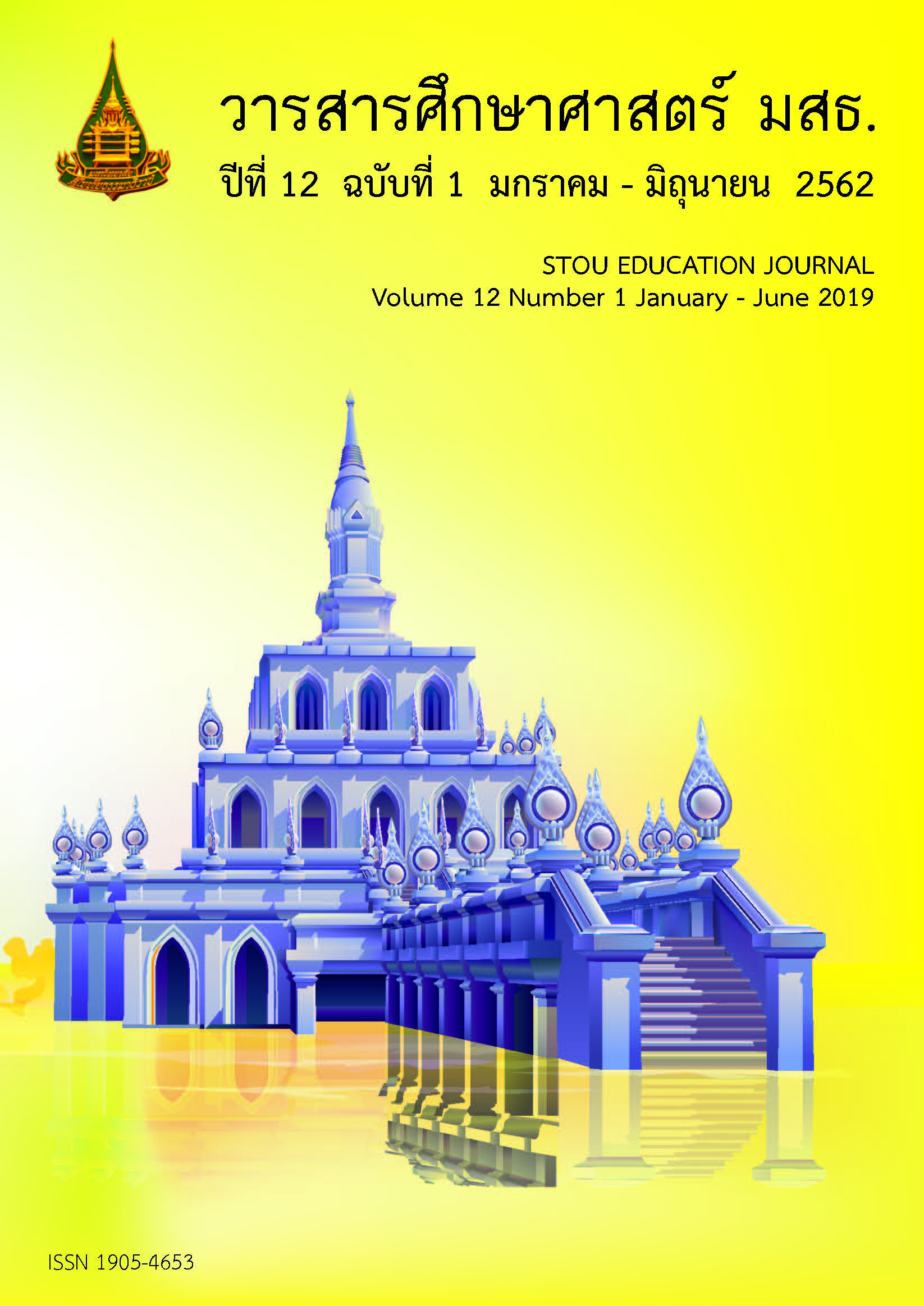การจัดการศึกษาบนพื้นฐานหลักปรัชญาของเศรษฐกิจพอเพียง: กรณีศึกษาโรงเรียนศรีแสงธรรม
Main Article Content
บทคัดย่อ
การวิจัยมีวัตถุประสงค์เพื่อศึกษา (1) สภาพการจัดการศึกษาของโรงเรียนศรีแสงธรรมก่อนนำหลักปรัชญาของเศรษฐกิจพอเพียงมาใช้เป็นหลักในการจัดการศึกษา และ (2) ผลการประยุกต์ใช้ ปัญหา อุปสรรคและผลกระทบในการนำหลักปรัชญาของเศรษฐกิจพอเพียงมาใช้ กรณีศึกษาในการวิจัย คือ โรงเรียนศรีแสงธรรม อำเภอโขงเจียม จังหวัดอุบลราชธานี ผู้ให้ข้อมูลสำคัญคือกลุ่มผู้มีส่วนเกี่ยวข้องกับการบริหารจัดการของโรงเรียนจำนวน 36 คน เครื่องมือที่ใช้ คือแนวการสังเกต แนวคำถามการสัมภาษณ์ และแบบบันทึกการศึกษาเอกสาร วิเคราะห์ข้อมูลโดยการวิเคราะห์เนื้อหา ผลการวิจัยปรากฏว่า (1) ก่อนการนำหลักปรัชญาของเศรษฐกิจพอเพียงมาใช้ โรงเรียนจัดการศึกษาด้วยความขาดแคลนทรัพยากรและขาดประสบการณ์ในการบริหารงาน และ (2) ผลการประยุกต์ใช้หลักปรัชญาของเศรษฐกิจพอเพียงในการบริหารงาน ทำให้โรงเรียนสามารถพึ่งตนเองได้อย่างยั่งยืน 1) ด้านการบริหารทั่วไป เน้นความประหยัดด้วยการใช้เทคโนโลยีสารสนเทศและสื่อสังคมออนไลน์มาใช้ร่วมกับระบบการทำงานสื่อสารภายใน การผลิตกระแสไฟฟ้าจากโซล่าร์เซลล์ ใช้จนได้รับการยกย่องให้เป็นโรงเรียนพลังงานทดแทนต้นแบบ มีการใช้ภูมิปัญญาท้องถิ่น และสร้างอาคารเรียนโดยไม่ใช้งบประมาณจากรัฐ 2) ด้านการพัฒนาหลักสูตร ใช้หลักความมีเหตุผล ความพอประมาณ และความมีภูมิคุ้มกันในการพัฒนาหลักสูตรโดยการบูรณาการหลักปรัชญาของเศรษฐกิจพอเพียง 3) ด้านการจัดการเรียนการสอน เน้นการนำความรู้ทางวิชาการมาสู่การปฏิบัติจริง และโรงเรียนสามารถสร้างนวัตกรรมและสิ่งประดิษฐ์ที่เป็นประโยชน์ต่อสังคมและชุมชน ผู้เรียนที่สำเร็จการศึกษาทุกคนสามารถสอบเข้ามหาวิทยาลัยของรัฐได้ และ 4) ด้านกิจกรรมพัฒนาผู้เรียน โรงเรียนส่งเสริมและพัฒนาผู้เรียนให้เป็นผู้มีคุณธรรม มีจิตสำนึกต่อสังคมชุมชนและสิ่งแวดล้อม ปัญหาและอุปสรรคสำคัญในการนำหลักปรัชญาของเศรษฐกิจพอเพียงมาใช้ในระยะแรก คือ ขาดแคลนครู ขาดผู้ทรงคุณวุฒิและผู้เชี่ยวชาญในการให้คำปรึกษา และสาธารณูปโภคประเภทไฟฟ้าและอินเทอร์เน็ตไม่สนองต่อความต้องการใช้งาน ผลกระทบด้านบวก คือ โรงเรียนสามารถพึ่งพาตนเองได้อย่างยั่งยืน มีชื่อเสียงเป็นที่ยอมรับของสังคม ครูมีคุณธรรมและมีคุณภาพ ผู้เรียนมีทักษะชีวิตสอดคล้องกับบริบทในท้องถิ่น โรงเรียนเป็นโรงเรียนพลังงานทดแทนให้กับชุมชน ผลกระทบด้านลบที่เกิดในระยะแรก คือ ผู้ปกครองและชุมชนยังไม่เข้าใจ และคิดว่าหลักปรัชญาของเศรษฐกิจพอเพียงไม่เหมาะกับการจัดการศึกษา
Article Details
เอกสารอ้างอิง
กัญญารักษ์ ศรีทองรุ่ง. (2550). การประยุกต์หลักปรัชญาเศรษฐกิจพอเพียงเพื่อพัฒนาแหล่งเรียนรู้และสื่อการเรียนการสอนโรงเรียนบ้านนาบอน สังกัดสำนักงานเขตพื้นที่การศึกษากาฬสินธุ์ เขต 3. (วิทยานิพนธ์ศึกษาศาสตรมหาบัณฑิตสาขาวิชาการบริหารการศึกษา ไม่ตีพิมพ์). มหาวิทยาลัยมหาสารคาม, มหาสารคาม.
ดรัณภพ เพียรจัด. (2551). การพัฒนารูปแบบการเรียนการสอนบนเว็บวิชาภาษาไทย ด้วยวิธีการเรียนรู้ร่วมกันและการเรียนรู้ด้วยกรณีศึกษาเพื่อสร้างค่านิยมการมีเหตุผลตามปรัชญาของ เศรษฐกิจพอเพียง สำหรับนักเรียนมัธยมศึกษาปีที่ 1. (วิทยานิพนธ์ครุศาสตรมหาบัณฑิต ไม่ได้ตีพิมพ์). จุฬาลงกรณ์มหาวิทยาลัย, กรุงเทพมหานคร.
ปริศนา กลั่นเขตกรรม. (2553). การศึกษาสภาพการดำเนินงานการบูรณาการแนวคิดเศรษฐกิจพอเพียง ในการศึกษาของโรงเรียนแกนนำหลักสูตรบูรณาการเศรษฐกิจพอเพียง สังกัดสำนักงานเขตพื้นที่การศึกษาศรีสะเกษ. (วิทยานิพนธ์ครุศาสตรมหาบัณฑิต ไม่ได้ตีพิมพ์). มหาวิทยาลัยราชภัฏอุบลราชธานี, อุบลราชธานี.
วัฒนาพร ระงับทุกข์. (2545). เทคนิคและกิจกรรมการเรียนรู้ที่เน้นผู้เรียนเป็นสำคัญตามหลักสูตรการศึกษาขั้นพื้นฐาน พ.ศ. 2544. กรุงเทพมหานคร: สุวีริยาสาส์น.
สำนักงานคณะกรรมการพัฒนาเศรษฐกิจและสังคมแห่งชาติ. (2555). แผนพัฒนาเศรษฐกิจและสังคมแห่งชาติ ฉบับที่สิบเอ็ด พ.ศ. 2555 – 2559. กรุงเทพมหานคร: สำนักงานสภาพัฒนาเศรษฐกิจและสังคมแห่งชาติ.
สำนักงานปลัดกระทรวงศึกษาธิการ. (2552). การศึกษา: รากฐานประชาคมอาเซียน. กรุงเทพฯ : โรงพิมพ์ สกสค. ลาดพร้าว.
สำนักงานเลขาธิการสภาการศึกษา. (2553). แผนการศึกษาแห่งชาติฉบับปรบปรุง (พ.ศ. 2552-2559). ฉบับสรุป. กรุงเทพฯ : พริกหวานกราฟฟิค จํากัด.


